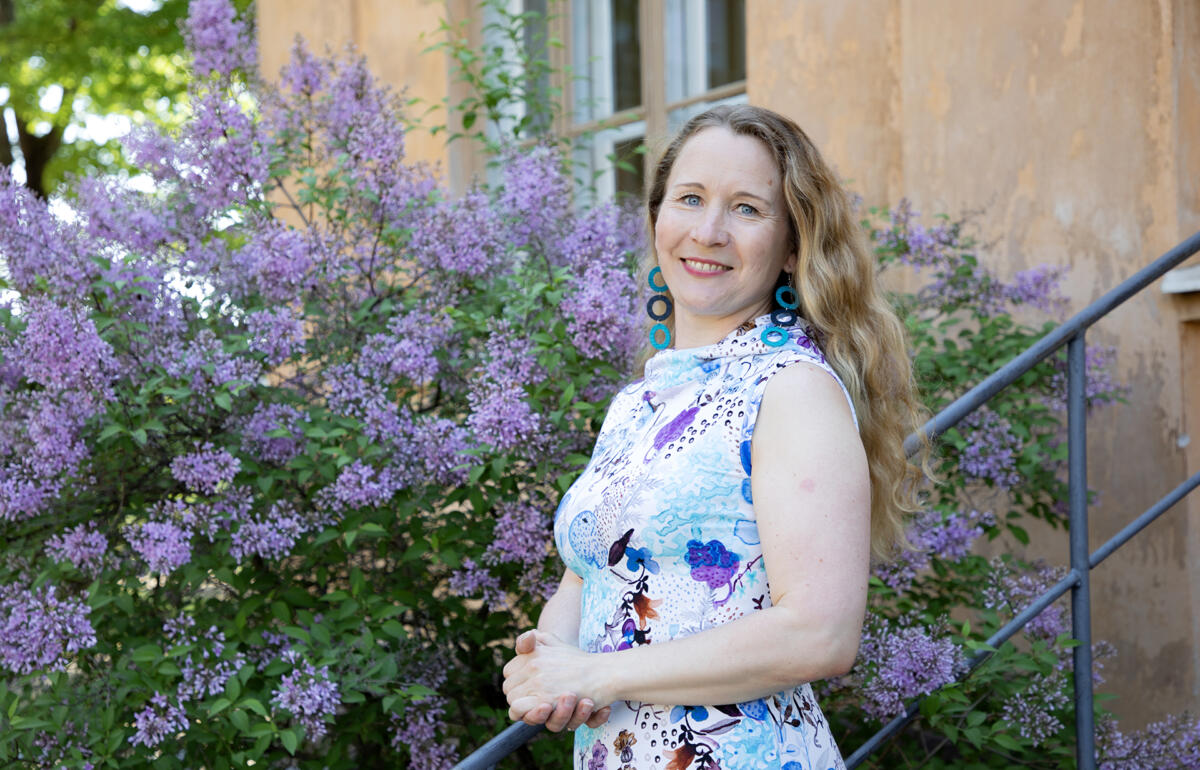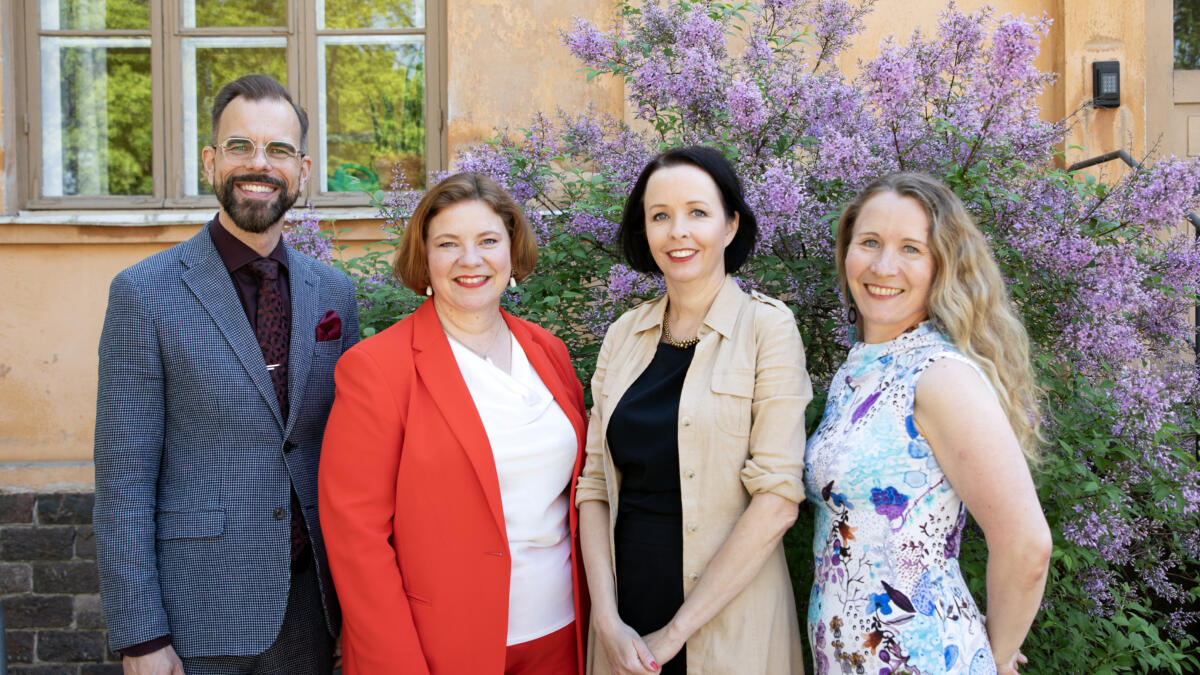Vice Dean of the Sibelius Academy Tuuli Talvitie: Smoother research journeys through community discussions
“Equality among doctoral researchers, smooth study paths and making research visible in the university’s everyday life – those are our key areas for development,” says Tuuli Talvitie, vice dean of the Sibelius Academy at Uniarts Helsinki.

Talvitie has been the vice dean responsible for research and doctoral education at the Sibelius Academy for about a year now. She has been closely involved in the development of doctoral education at both the Sibelius Academy and the entire Uniarts Helsinki.
“My main sources of inspiration in day-to-day work come from my core duties: reforming doctoral education and strengthening the role of research. Every doctoral degree is, of course, unique and requires different kind of support. But it’s also fascinating and important to consider how we can make our doctoral researchers’ study paths even more equitable.”
When Talvitie began in her role as vice dean, she was tasked with merging the Sibelius Academy’s doctoral schools.
“Initially, I thought my work would focus solely on internal changes within the Sibelius Academy. However, it soon became clear that this is part of a broader reform across the entire Uniarts Helsinki, with one of the goals being the establishment of a joint researcher school.”
Towards doctoral degrees with a smoother workflow – diversity as a strength
One of Talvitie’s central goals is to harmonise the treatment of doctoral researchers across the university.
“For example, the amount of supervision that doctoral researchers receive has varied between our academies, and this is something we need to address. We also aim to clarify the processes and study paths within doctoral education so that a doctoral degree can realistically be completed within four years, while still allowing flexibility for longer study paths.”
Talvitie points out that doctoral education at the Sibelius Academy is uniquely diverse, offering space for both traditional academic research and artistic research.
“I want to maintain this diversity and flexibility – in my view, it is absolutely our superpower.”
At the Sibelius Academy, there are many different pathways to a doctoral degree. In some disciplines, many students continue directly into doctoral studies after completing their master’s degrees, while in others, it is common to begin doctoral studies only after a long and successful artistic career.
Highlighting international uniqueness
Art-based research offers the opportunity to explore the ways of making art, the processes involved and artistic expertise in depth. It stems from the artist’s personal experience and craftsmanship and is, therefore, a unique form of research compared to traditional academic research. Talvitie notes that Uniarts Helsinki has well-established, interdisciplinary traditions in art-based research.
“This is something special on an international level – something we should recognise ourselves and take full advantage of. Very few universities have the education of musicians and music research located within the same organisation or have them combine art and research, as is the case with us. For these reasons, we have a unique opportunity to engage in critical and enriching discussions between art and research.”
Talvitie is an advocate for multidisciplinary and cross-disciplinary research. But why should a university even engage in artistic and art-based research?
“If the Sibelius Academy didn’t exist, where in Finland would the expertise in music and art-based research be developed? Nowhere! We do world-class work here. Sure, research in art and culture plays a different role in society compared to fields like medicine or law. But I hope that society will come to appreciate the unique perspectives it, too, offers.”
Talvitie reflects that new and interesting ideas could emerge from joint initiatives with other research fields: what could, for example, be achieved if music and legal researchers collaborated?
New directions and ideas emerge from community engagement
Talvitie and her colleagues have been actively visiting the Sibelius Academy departments and programmes, discussing how research and the connection between research and bachelor’s/master’s education could be strengthened.
“We have talked about what research and art-based research mean, and we’ve recognised that research plays a very different role in different units. There probably isn’t one single direction for development – and that’s completely fine.”
Concrete development ideas have also emerged: suggestions for joint research reviews, book clubs, research groups and research projects where researchers and artists could meet and engage in a dialogue from their respective areas of expertise.
“Our goal is to make research and doctoral education more accessible and visible in the daily lives of all students. The next step is to refine and share these ideas throughout the Sibelius Academy. It’s also important to ensure that the transition between bachelor’s and master’s studies and doctoral studies is as smooth as possible.”

Tuuli Talvitie
- Vice dean responsible for research and doctoral education at the Sibelius Academy, Uniarts Helsinki, during a five-year term from 2022 to 2027.
- Also acts as the head of services related to doctoral education and research at the Sibelius Academy and as the supervisor for several department and programme heads within the academy.
- Graduated with a PhD from the Department of Music Studies at the University of Tampere in 2010.
- Has worked in administrative and leadership roles in music institutions since 2010.
- Previously served as the rector of Käpylä Music School and worked as a researcher at the University of Tampere’s Department of Music Studies.
- Has performed as a violinist in various folk music, popular music and chamber music ensembles.
- Hobbies include driving her children to activities, cheering them on and supporting them on the sides of football pitches and in practice and concert halls alike.